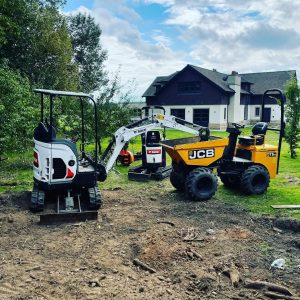Mini diggers, also known as compact excavators, have revolutionized the way construction, landscaping, and agricultural projects are carried out. These versatile machines are designed to navigate tight spaces and perform a variety of tasks with precision and efficiency. However, with a wide range of models and specifications available on the market, choosing the right mini digger for your project can be a daunting task. In this comprehensive guide, we’ll walk you through the key factors to consider when selecting a mini digger to ensure that it meets your specific requirements.
- Assess Your Project Needs: Before you start browsing through mini digger options, take the time to assess your project requirements. Consider factors such as the size of the job site, the type of terrain you’ll be working on, and the specific tasks you need the mini digger to perform. Are you digging trenches, landscaping, or moving heavy materials? Understanding your project needs will help you narrow down your options and make an informed decision.
- Consider Size and Weight: Mini diggers come in various sizes and weight classes, ranging from compact models weighing less than a ton to larger machines weighing several tons. The size and weight of the mini digger will determine its manoeuvrability and lifting capacity. Choose a size that is suitable for your project requirements while ensuring that it can access tight spaces and navigate challenging terrain with ease.
- Evaluate Digging Depth and Reach: The digging depth and reach of a mini digger are critical factors to consider, especially if you’re working on projects that require excavation or trenching. Determine the maximum depth and reach you’ll need for your project and select a mini digger that can meet or exceed those requirements. Keep in mind that larger models typically offer greater digging depth and reach but may require more space to operate.
- Assess Power Source and Fuel Efficiency: Mini diggers are available in both diesel and electric models, each offering its own set of advantages. Diesel-powered mini diggers are known for their robustness and high torque, making them ideal for heavy-duty tasks and outdoor use. On the other hand, electric mini diggers are quieter, emission-free, and more environmentally friendly, making them suitable for indoor or urban environments. Consider your power source preferences and evaluate the fuel efficiency of the mini digger to minimize operating costs over the long term.
- Check Attachments and Versatility: One of the key benefits of mini diggers is their ability to accommodate a wide range of attachments, such as buckets, augers, grapples, and hydraulic breakers. These attachments can significantly enhance the versatility and functionality of the mini digger, allowing you to tackle various tasks with a single machine. When choosing a mini digger, inquire about the available attachments and ensure that they are compatible with your specific project requirements.
- Evaluate Operator Comfort and Safety Features: The comfort and safety of the operator should always be a top priority when selecting a mini digger. Look for models that are equipped with ergonomic controls, adjustable seats, and ample visibility to ensure that the operator can work comfortably and safely for extended periods. Additionally, consider safety features such as ROPS (Roll-Over Protective Structure) and FOPS (Falling Object Protective Structure) to minimize the risk of accidents and injuries on the job site.
- Compare Maintenance and Serviceability: Like any piece of machinery, mini diggers require regular maintenance to ensure optimal performance and longevity. Before making a purchase, compare the maintenance requirements and serviceability of different models. Look for features such as easy access to engine components, onboard diagnostics, and comprehensive warranty coverage to streamline maintenance tasks and minimize downtime.
In conclusion, choosing the right mini digger for your project requires careful consideration of various factors, including project needs, size and weight, digging depth and reach, power source, attachments, operator comfort and safety, and maintenance requirements. By evaluating these factors and selecting a mini digger that aligns with your specific requirements, you can ensure successful project execution and maximize productivity on the job site.



